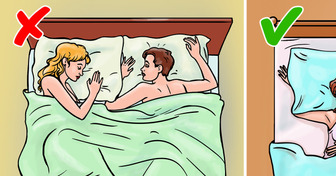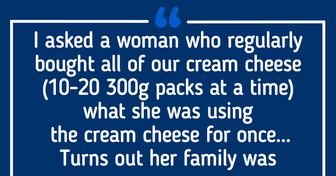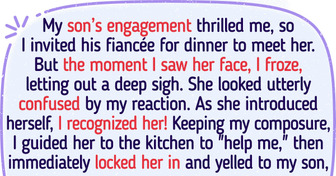9 Unexpected Things That Show a Marriage Won’t Last Long

Weight loss has become the chief concern of most of today’s population. It’s a fad now to try different exercise regimens and various kinds of diets. However, there isn’t much reality in what’s believed to be true about these weight loss tricks. A few sachets of tea or saying goodbye to your favorite food may not be all that you need.
At Bright Side, we put together a few clarifications that are straight from the popular weight loss gurus themselves. It’s time to clear the air about weight loss.
Who said you have to give up your favorite food? Maybe you also believe that your plate should have fewer food options? Here’s some welcome news. Add a little extra on that plate. Maybe some veggies or some nuts.
If you are forcing yourself to stop eating and depriving yourself of your favorite food this will eventually become the reason you give in to the foods you’ve been craving. Don’t do that. As explained by Rebecca Scritchfield, R.D.N., author of the book Body Kindness, “When you focus more on what you add into your healthy eating patterns — like adding a side of veggies on pizza night — rather than taking away foods you love, you free yourself from ’the diet crazies.’ You silence the constant thoughts about food and build trust with your body in a more positive way.”
So, your dietician tells you that oatmeal is good for you. And you end up preparing it with loads of butter and probably plan to have a second or third serving. The hard fact is that you could have actually gorged on a burger instead of this. Quantity, quality, and portions are very important. The above image is a small guide showing you the approximate size of portions depending on which foods you’re eating.
To satiate your hunger, serve yourself fruit or some toasted veggies so that your urge to eat more doesn’t spoil your diet regimen. Also, another tip suggested by Cornell University Food Lab is that you should try to contrast the color of your food with your plate, because the color contrast will help you realize the quantity of food you have.
You lose weight and are eager to show off your before and after pictures with your friends. And then you go over which meal plan worked, what you ate, etc. What we forget to realize and tell others is the commitment we showed to lose weight, and the effort that was put in by us.
You as a person have put in so much for this cause. You’re still the same person, with or without those extra pounds. Praise your will power, not your waist line. As rightly said by Scritchfield, “It’s possible to enjoy your body at any size and take good care of it.”
Don’t miss out on those precious hours of sleep just to spend an extra hour at the gym. As explained by Dr. Caroline Apovian, “Getting less than 7 to 9 hours of sleep per night ramps up the hunger hormone ghrelin and decreases the satiety hormone leptin. Lack of sleep also interferes with impulse control, making it less likely that you will stick to healthy food choices and portion sizes the following day.”
“Getting less sleep than needed also heightens cortisol levels, which prompts the body to overeat to refuel after fighting off a stressor,” she added.
A good diet changes your lifestyle completely and not just the way you look. People generally associate dieting with weight loss, when in actuality the person goes through an entirely healthy change.
According to Chanté Wiegand, ND, Naturopathic Doctor and Director of Education at The Synergy Company, “Losing weight is about more than the number on the scale. Following fad diets may promote quick weight loss but typically results are fleeting and may lead to even greater weight gain once you resume your usual eating patterns. To lose weight for good, you need to adopt an all-around lifestyle change that includes what you eat, how you prepare food, and how often you move your body.”
Now that you have adopted a diet plan, you might often find yourself watching that plate carefully before eating. It’s because you’ve started counting the calories you are taking in.
As advised by Sanfilippo, don’t keep track of each and every gram eaten, but instead try tracking your calorie intake. Counting calories is actually pretty important. This way, you are fully aware of what and how much you are eating and this helps you in achieving your goal faster.
There are many diets gaining popularity these days like keto, vegan, paleo, low fat, etc. But the mistake we are making is believing that what worked for others will work for us too. Don’t just do a diet because it worked for a friend. Assess your own body first.
As clarified by Dr. Wiegand, “What works for one person may make someone else ill or may simply not be effective.”
If you think eating in between meals or snacks can affect your strict diet plan, you’re kind of wrong. A healthy snack consumed when hunger strikes may help prevent overeating during meal times. Any snack that is rich in protein will not only make you feel fuller but will also keep the cravings in control.
As Fisher suggests, “I recommend nuts, seeds, fruit, yogurt, cheese sticks, air popped popcorn, and low sugar granola bars.”
A lot of times, we are not able to see through our hunger pangs and realize that we are actually not hungry, but just going through a mood swing which creates the temptation to eat. For instance, when you are bored or angry or upset, you may feel like sitting alone and eating. A good dietician will always advise against this.
Identify whether you are actually hungry or not. If you can’t imagine eating a carrot stick, you are not hungry. As dietician and nutritionist Ruth Frechman pinpoints, “While it’s definitely easier said than done, try to pause and think about whether you are physically hungry before taking that first bite.”
You may think that a craving for a certain food is your weakness and you just can’t give in. There is new research that has shown that cravings are very natural and that their intensity varies from person to person.
As further explained by Frank Greenway, MD, Chief Medical Officer at the Pennington Biomedical Research Center in Baton Rouge, LA, “We now know when people are most vulnerable to cravings (early evening) and which age groups crave more (young females crave more than older males, and younger female dieters crave more than older male dieters). Knowing your personal ’risk factors’ can help you manage your cravings.”
Many people these days are opting for weight loss surgeries. They think that this will transform them instantly without having to go through exercising and dieting. You are not only required to go through a certain amount of weight loss before the surgery, but you also have to keep it under control after surgery.
“Liposuction may remove up to a few pounds from the midsection during surgery, but it’s a sculpturing tool, not a weight loss tool” says Joshua D. Zuckerman, MD, FACS, a New York City board-certified plastic surgeon.
We generally avoid eating certain fatty things like avocado, nuts, and dairy products thinking that they will make us fat. While it’s obvious that these have fats, they are essential fats that don’t hamper the weight loss process but in fact help it.
As explained by Eliza Savage, MS, certified dietitian nutritionist at Middleberg Nutrition in NYC, “Fat is digested slower than carbs and protein and will also help promote satiety. Full-fat dairy products, nuts, and plant-based fats promote weight loss, not inhibit it.”
You might not believe this but certain medicines could also be contributing to your weight gain. For instance, your allergy medicines could be playing a part. It’s actually better to avoid unnecessary medication altogether and instead use sprays and ointments whenever possible.
As shared by Chandler Park, MD, founder of CancerVisit.com at the University of Kentucky College of Medicine, “Some common over-the-counter medications can hurt weight loss. I advise people trying to lose weight to use antihistamines sparingly.”
A friend of yours lost weight like crazy and in almost few days’ time instead of months! You start feeling resentful of their success story.
However, let us show you a window of truth in the words of Rachel Goodman, RD, CDN owner of Rachel Good Nutrition, “Fast weight loss, like 10 pounds in two weeks, that results from extreme food restriction, juice cleanses, or cutting out carbohydrates completely is mostly due to loss of water weight and muscle mass, and can be very unhealthy. This weight loss is not sustainable and is usually gained back fast and results in a cycle of yo-yo dieting, which messes up your metabolism. The actual pounds you want to lose and keep off—pounds of fat—require a meal plan that includes all food groups and is not overly restrictive so that you can fuel your body to burn fat efficiently.”
A fiber rich diet gets applauded at almost all dieticians’ clinics. People have come to believe that by including fiber in the diet, they can achieve their weight loss goals in the quickest manner. However, this is just half the truth.
As per Brooke Zigler, dietician, “When adding fiber to your diet, it’s very important to drink water throughout the day to prevent bloating. It’s also encouraged to eat protein with fiber, which promotes satiety.”
Weight loss should be done for your own self, and not to show to the world. Similarly, weight loss is not a trend, but is customized according to the individual. Have more suggestions for people trying to lose weight? You may drop them in the comments section below.











